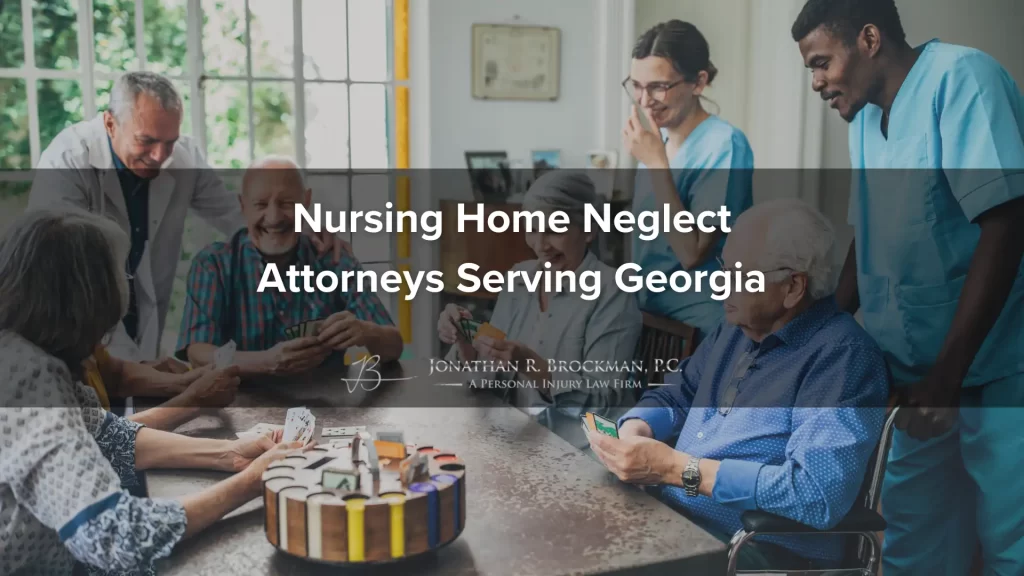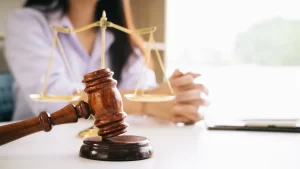
One of the hardest decisions we may ever have to make is the one to put a loved one in an assisted living facility or nursing home. It is a decision that forces us to put the well-being and care of our parent or grandparent in the hands of someone else. While these caregivers are supposed to be professionals, once in a while they break our trust in the form of neglect or abuse of our loved one. Navigating a claim for nursing home abuse or neglect can be confusing and difficult. You never expect to have to deal with something like this, so do not try to do it yourself. Contact an experienced Georgia nursing home abuse attorney instead. We will work to ensure that these parties are held responsible for their actions.
Recognizing and Defining Nursing Home Neglect and Abuse
Nursing home neglect is typically described as the failure of a caregiver to provide the necessary services to an adult to whom the caregiver has a contractual or legal duty to provide these services. Failure to provide proper care presents an imminent danger to the safety, health, or welfare of the client and may result in significant injuries or even death.
Nursing home abuse is described as the infliction of sexual, physical, or emotional harm or injury including the financial exploitation by any firm, person, or corporation.
Neglect and abuse can take on many forms, and it can be difficult to prove. The following are a few of the most common types of neglect and abuse:
- Abuse: Broken bones, over medicating, choking, dehydration, physical abuse, sexual abuse, mismanagement of diabetes, bed sores and pressure sores, scalding burns, falls and transportation accidents, feeding tube issues, urinary tract infections, malnutrition, and wrongful death.
- Neglect: Emotional or social neglect when a person is repeatedly left alone, ignored, or verbally abused; personal hygiene neglect where the person receives inadequate help with bathing, laundry, cleaning, brushing teeth, or hygienic practices; basic needs neglect when the nursing home neglects to provide the individuals with food, water, or a safe and clean environment; and falls when caregivers fail to provide proper care and assistance when helping patients move about.
While some types of neglect and abuse are distinctly noticeable, many times they are much harder to spot. Sometimes the victim will show signs of mistreatment. These signs may include, but are not limited to, the following:
- Dehydration or Sudden Loss of Weight: If you notice these things, speak to your loved one’s doctor about it. While some facilities are multi-million dollar facilities, they budget very little for proper nutrition of their patients.
- Multiple Falls: There should be adequate measures in place to protect your loved one during transportation including the use of chair or bed alarms and more. Many falls happen during the transporting of the patient between the bed and chair, but most are preventable with proper care.
- Wounds on the Heels or Tailbone: Patients who are bedridden should be turned and repositioned frequently or placed on air mattresses to prevent bedsores and pressure sores.
- Changes in Activity or Mood: Facilities should have the appropriate personnel to monitor and administer medications correctly. Changes in your loved one’s mood or activity level could indicate that their medications are not being given correctly.
- Unexplained Cuts and Bruises: If your loved one is experiencing abnormal cuts and bruises that cannot be explained, it could be a sign of abuse.
- New or Worsening Disorientation or Confusion: If your loved one is suddenly confused or disoriented, or his or her condition seems to be worsening, look to see if there is an explanation for these changes.
How to Protect Your Loved One
Despite the time and care we put into selecting the best facility for our loved one, neglect and abuse in nursing homes is not always foreseeable. Fortunately, there are certain measures we can take to identify the kind of care our loved one is likely to receive. Consider asking the facility the following questions:
- Does the nursing home meet all state licensing requirements?
- Is there a written plan of care for each resident?
- Does a physician regularly visit the residents to provide medical check-ups?
- Do the residents appear happy, clean, comfortable, and adequately dressed?
- Does the facility and its surroundings appear clean, adequately heated/cooled, and odor-free?
- Can the staff provide 24-hour care to the residents if needed?
- Is there someone available that routinely participates in activities with the residents?
- Does the facility provide three nutritionally sound meals seven days a week, even on holidays, to the residents?
Grounds for Legal Action
 If you believe your loved one has been the victim of nursing home neglect or abuse, you need to speak with an attorney about your legal options. We will listen to your story, start an investigation, and advise you of your rights. Some of the common grounds for filing a nursing home neglect or abuse case include the following:
If you believe your loved one has been the victim of nursing home neglect or abuse, you need to speak with an attorney about your legal options. We will listen to your story, start an investigation, and advise you of your rights. Some of the common grounds for filing a nursing home neglect or abuse case include the following:
- Negligent Hiring: Nursing homes are obligated to ensure the personnel they hire are qualified for the position for which they are hired. They also must ensure that the person does not have a history of abuse or violence. If a facility hires an employee without verifying this information, or keeps an employee they know is incompetent, the facility can be held liable for any harm that occurs to residents that was caused by the incompetent employee.
- Understaffing: The Center for Disease Control and Prevention shows that the average staff ratio for residents to staff members is one staff member to every 1.64 residents. When a nursing home fails to keep enough staff on hand to care for their residents, the residents may be neglected and suffer harm.
- Inadequate Training: In some situations, nursing home employees are not given proper training on how to handle difficult or disabled residents. When this happens, they may not be able to provide the level of care that state law requires or what is expected by family members of the resident. If the patient is injured due to inadequate training, the nursing home may be held accountable.
- Third-Party Claims of Responsibility: If a third party injures a resident in a nursing home, the facility could still be held liable. They are required to provide a safe environment, and if they failed to do so, they may be responsible. This may include injuries caused by another resident or a guest of a resident.
- Breach of Regulatory or Statutory Rights: Residents of nursing facilities are entitled to privacy, autonomy, and dignity. If the facility or employee violates these fundamental rights, the facility may be held liable.
- Medication Errors: Taking medicine is part of a daily routine for many people in a nursing home. If they do not take the correct dosage at the correct time, it could result in drug errors that harm the patient.
- Failure to Provide a Clean, Safe Environment: Many residents in nursing homes already have weakened immune systems making them even more at risk for infections. If a facility is not regularly sanitized the risk of infection and other health issues for the residents increases. This can be considered negligent by the facility.
Contact an Experienced Georgia Nursing Home Abuse Attorney Today
If you believe your loved one has been the victim of nursing home neglect or abuse, contact the Georgia nursing home abuse lawyers at Jonathan R. Brockman, P.C., today and request a consultation at one of our Georgia locations.
